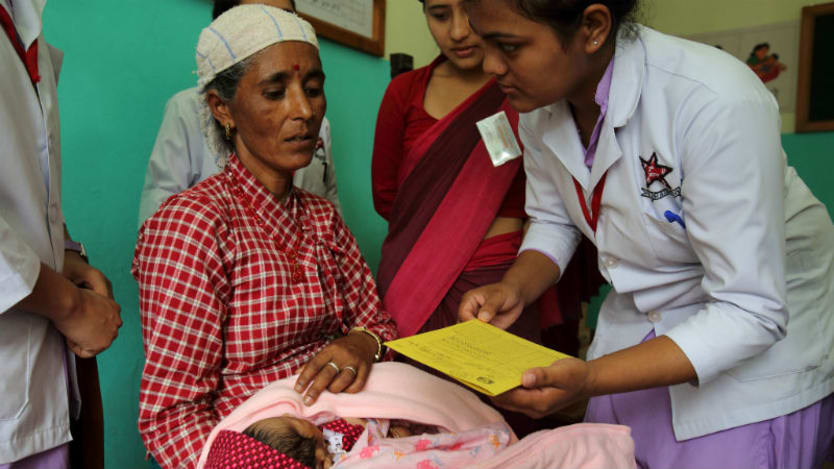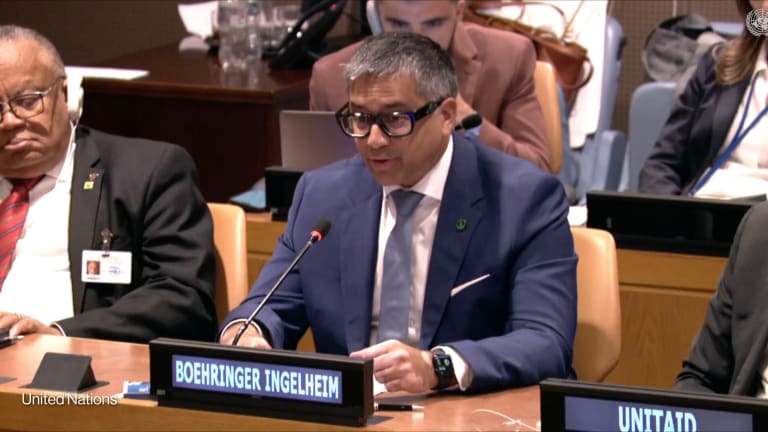
The United Nations will host two high-level meetings this fall on tuberculosis and noncommunicable diseases, which are meant to spur new action around both global threats. Hopefully, the meetings will also be used to highlight the numerous connections between TB and NCDs.
Many of the risk factors for TB and NCDs are shared, including diabetes and smoking: diabetes triples a person’s risk of developing TB; tobacco smoking increases the risk of TB, as well as the risk of dying from TB. There is also ample evidence that preventing diabetes and abstaining from smoking contribute to healthier pregnancies and childhoods.
At a basic level, countries of people living with or at risk of TB or NCDs need the same thing: Resilient, sustainable health systems that meet the needs of their populations, including the most vulnerable. To prevent death, sickness, and catastrophic health costs, we need to address health risks whether they’re from infectious or noncommunicable diseases.
NCDs are both a cause and a consequence of poverty. NCDs are a greater threat to global economic development than natural disasters, crime, and corruption. Infections and environmental exposures associated with poverty contribute to death and disability from NCDs. Likewise, TB is a cause and consequence of poverty: It thrives among people with poor nutrition, health status, and housing conditions.
“Countries of people living with or at risk of TB or NCDs need the same thing: Resilient, sustainable health systems that meet the needs of their populations, including the most vulnerable.”
—TB, an airborne disease, is responsible for nearly 4,700 deaths each day. TB has a cure rate of over 90 percent — if diagnosed and treated promptly and appropriately. Globally, NCDs are the leading cause of death. Annually, 41 million people worldwide die from NCDs, including cancer, cardiovascular disease, diabetes, respiratory diseases, and mental disorders. Most deaths — 75 percent — occur in low- and middle-income countries.
All countries face challenges in building health systems that meet the needs of their populations, particularly the most vulnerable. Right now, certain groups often get excluded, and they’re likely to keep getting excluded if we don’t take specific steps to include them. Children provide a good example.
How would we build health systems differently, and what impact would we see, if we started with the needs of the population and supported the flexibility to address those needs?
Millions of children, adolescents, and young people live with or are affected by NCDs. Yet the World Health Organization defines premature deaths from NCDs as those affecting people ages 30-70. There is no strategic reason for this; it’s primarily because many countries traditionally have not collected NCD data on children. This means that children and adolescents are left out of many NCD discussions — and will not be screened or treated.
Meanwhile, it is estimated that there are roughly 1 million annual cases of childhood TB and 250,000 childhood deaths — counted as age 15 and below. Many of these cases and deaths are misclassified as caused by pneumonia and malnutrition. Children have a much higher rate of certain life-threatening forms of TB, such as meningitis and disseminated — where multiple organs are involved — disease, and chest X-rays are an important part of diagnosing children for TB. However, that requires having the right equipment, so WHO recommends that high-burden countries base TB diagnoses on sputum microscopy — which means that TB in children will often be missed, and they will not be treated.
How do we reach people who have been neglected? The answers will be different for each case, but they all begin with prevention. For example, half of adult NCDs begin in childhood, and most of the behaviors that underlie NCDs begin during adolescence.
We should also build on the platforms we already have, including clinics and services for mothers and children.
Fortunately, there are signs that governments and other stakeholders might be willing to finally address children’s exclusion. The importance of a “life-course” approach, which addresses the unique needs of each age group, was raised at the U.N. civil society hearings leading up to the high-level meetings, and has been included in the events’ draft outcomes documents. The report of the WHO Independent High-Level Commission on NCDs states: “Children and older people have often been excluded from the NCD discourse, which must be expanded to include people at all ages throughout the life course, and which must be understood in its specific gender dimensions.”
In advance of the high-level meetings in September, we call on heads of governments and other high-ranking officials to make commitments and support global plans to reduce the unacceptably high tolls that NCDs and TB exact on health, well-being, and economic growth around the world. We urge participants to take the opportunity to highlight the many connections between NCDs and TB.
This is a seminal moment: How policies for children and other vulnerable populations fare at both events will reveal our collective commitment to health equity.
For more coverage of NCDs, visit the Taking the Pulse series here.










